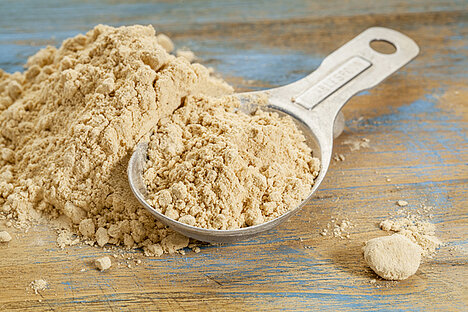Primrose root

Primrose root is a medicinal plant that has been used in folk medicine for centuries. It belongs to the primrose family and is mainly found in spring. The root contains mucilage, saponins, flavonoids and essential oils, which can have a positive effect on the respiratory tract. In this article, you will find out how you can use primrose root for your dog, what benefits and disadvantages it has and what you should look out for.
What is primrose root?
Primrose root is the root of the primrose (Primula veris), which is also known as cowslip or meadow primrose. It grows in meadows, pastures and sparse forests in Europe and Asia. The yellow flowers are edible and are sometimes used as a salad garnish or tea. The root is dug up in the fall or spring, dried and crushed.
How does primrose root work?
Primrose root has an expectorant, anti-inflammatory and antispasmodic effect. It can help with coughs, bronchitis, asthma and other respiratory diseases by loosening mucus and making breathing easier. It can also soothe mucous membranes and relieve irritation. Primrose root can also help with gastrointestinal complaints such as flatulence, cramps or constipation, as it promotes digestion and stimulates intestinal activity.
How can you use primrose root for your dog?
You can give your dog primrose root as a tea, tincture or pressed juice. You can also combine it with other medicinal herbs such as thyme, licorice or marshmallow to enhance the effect. The dosage depends on your dog's size, weight and state of health. As a guide, you can assume the following quantities:
- Tea: Brew 1 teaspoon of dried primrose root per cup of water and leave to infuse for 10 minutes. You can give your dog 1 to 3 cups of this a day, depending on its size.
- Tincture: Mix 1 part dried primrose root with 5 parts alcohol (e.g. grain or vodka) and leave to infuse for 2 to 4 weeks. You can give your dog 5 to 20 drops of this daily, depending on its size.
- Pressed juice: You can buy ready-made organic pressed juice from primrose root or make it yourself by juicing fresh primrose root. You can give your dog 1 to 3 teaspoons of this daily, depending on its size.
What are the benefits of primrose root for your dog?
Primrose root can help your dog with various ailments, especially if he suffers from respiratory problems. It can alleviate symptoms, speed up healing and strengthen the immune system. Primrose root is a natural alternative to synthetic medications, which can often have side effects. It is also relatively cheap and easy to obtain.
What are the disadvantages of primrose root for your dog?
Primrose root is not suitable for every dog. It can cause allergic reactions in some dogs, especially if they are sensitive to primroses. Symptoms may include a skin rash, itching, swelling or difficulty breathing. In this case, you should stop using it immediately and consult a vet. In addition, excessive or prolonged use of primrose root can lead to stomach irritation, diarrhea or vomiting. You should therefore always adjust the dosage to your dog and not continue using it for longer than 2 to 3 weeks.
What should you watch out for?
Before giving your dog primrose root, you should always find out about the quality, origin and tolerability. It is best to buy organic products or collect the primrose root yourself if you know your way around. Make sure that you only use the root of the primrose and not the other primrose species, some of which are poisonous. Primula obconica in particular is highly poisonous to dogs and can lead to death in the worst case scenario. If you are unsure, have the primrose root identified by an expert or do without it. You should also always consult your vet before giving your dog primrose root, especially if they are already taking other medication or are chronically ill. Primrose root can interact with some medications or influence their effect. Your vet can also help you with the dosage and duration of use.
Primrose root is a medicinal plant that can help your dog with respiratory and digestive problems. It has an expectorant, anti-inflammatory and antispasmodic effect and can soothe the mucous membranes. You can give it as a tea, tincture or pressed juice, but always with caution and in moderation. Not all dogs tolerate primrose root well and some types of primrose are poisonous to dogs.
Properties 6
Are you looking for other ingredients with a specific property?
Just click on them to find more.
If you notice any signs of hypersensitivity or poisoning in your dog, you should see your vet immediately. We are not a substitute for a vet, but we try to be as accurate as possible. Every dog reacts differently and we recommend you get a second opinion or consult your vet if in doubt.
Stay healthy and take good care of your four-legged friend!😊